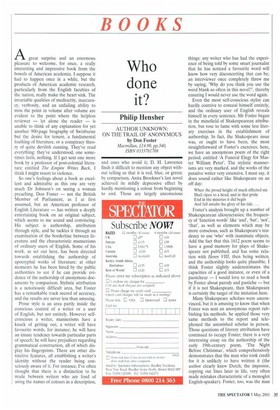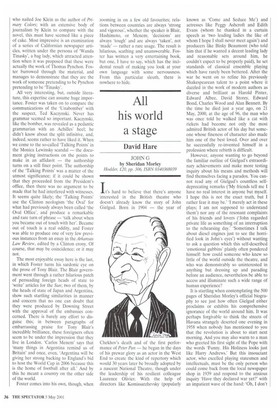Who done it?
Philip Hen sher
AUTHOR UNKNOWN: ON THE TRAIL OF ANONYMOUS by Don Foster Macmillan, £14.99, pp.340, ISBN 0333781708 Agreat surprise and an enormous pleasure to welcome, for once, a really interesting and impressive book from the bowels of American academia. I suppose it had to happen once in a while, but the products of American academic research, particularly from the English faculties of the nation, really make the heart sink. The invariable qualities of mediocrity, inaccuracy, verbosity, and an unfailing ability to miss the point in volume after volume are evident to the point where the helpless reviewer — let alone the reader — is unable to think of any explanation for yet another 900-page biography of Swinburne but the desire for tenure, a fundamental loathing of literature, or a conspiracy theory of quite devilish cunning. They've read everything; they've understood, one sometimes feels, nothing. If I get sent one more book by a professor of post-colonial literature entitled The Empire Writes Back, I think I might resort to violence.
So one's feelings about a book as excellent and admirable as this one are very much Dr Johnson's on seeing a woman preaching. Don Foster — not the British Member of Parliament, as I at first assumed, but an American professor of English Literature — has written a deeply entertaining book on an original subject, which seems to me sound and convincing. His subject is authorship, attribution through style, and he tackles it through an examination of the borderline between literature and the characteristic mannerisms of ordinary users of English. Some of his work, as set out here, has been directed towards establishing the authorship of apocryphal works of literature; at other moments he has been hired by the public authorities to see if he can provide evidence of the authorship of anonymous documents by comparison. Stylistic attribution is a notoriously difficult area, but Foster has a remarkable track record of accuracy, and the results are never less than amusing.
Prose style is an area partly inside the conscious control of a writer or a user of English, but not entirely. However selfconscious a writer, mannerisms have a knack of getting out; a writer will have favourite words, for instance; he will have an innate tendency towards particular parts of speech: he will have prejudices regarding grammatical construction, all of which display his fingerprints. There are other distinctive features, all establishing a writer's identity without the reader being consciously aware of it. For instance, I've often thought that there is a distinction to be made between writers who are fond of using the names of colours in a description, and ones who avoid it; D. H. Lawrence finds it difficult to mention any object without telling us that it is red, blue, or green; by comparison, Anita Brookner's last novel achieved its mildly depressive effect by hardly mentioning a colour from beginning to end. Those are largely unconscious things; any writer who has had the experience of being told by some smart journalist that he has noticed a favourite word will know how very disconcerting that can be; an interviewer once completely threw me by saying, 'Why do you think you use the word blank so often in this novel?', thereby ensuring I would never use the word again.
Even the most self-conscious stylist can hardly contrive to conceal himself entirely, and the ordinary user of English reveals himself in every sentence. Mr Foster began in the minefield of Shakespearean attribution, but rose to fame with some less literary exercises in the establishment of authorship. In fact, the Shakespeare issue was, or ought to have been, the most straightforward of Foster's exercises; here, we have an anonymous poem of the right period, entitled 'A Funeral Elegy for Master William Peter'. The stylistic mannerisms are very marked, and the works of the putative writer very extensive. I must say, it does sound rather like Shakespeare on an off day:
When the proud height of much affected sin Shall ripen to a head, and in that pride End in the miseries it did begin And fall amidst the glory of his tide .. .
Foster's analysis brought up a number of Shakespearean idiosyncrasies; the frequency of 'function words' like 'and', 'but', 'not', 'that', as well as elements which may be more conscious, such as Shakespeare's tendency to use 'who' with inanimate objects. Add the fact that this 1612 poem seems to have a good memory for plays of Shakespeare not published, and has some relation with Henry VIII, then being written, and the authorship looks quite plausible. I think Foster slightly underestimates the capacities of a good imitator, or even of a pasticheur — I would love to read a book by Foster about parody and pastiche — but if it is not Shakespeare, then Shakespeare is certainly the target of the imitation here.
Many Shakespeare scholars were unconvinced, but it is amusing to know that when Foster was sent an anonymous report rubbishing his methods, he applied those very same methods to the report and telephoned the astonished scholar in person. Those questions of literary attribution have continued to occupy Foster; there is a very interesting essay on the authorship of the early 19th-century poem, 'The Night Before Christmas', which comprehensively demonstrates that the man who took credit for it is unlikely to have written it (the author clearly knew Dutch; the impostor, copying out lines later in life, very often made mistakes characteristic of a monoglot English-speaker). Foster, too, was the man who nailed Joe Klein as the author of Primal)) Colors; with an extensive body of journalism by Klein to compare with the novel, this must have seemed like a piece of cake. Most impressive is an examination of a series of Californian newspaper articles, written under the persona of 'Wanda Tinasky', a bag lady, which attracted attention when it was proposed that these were actually the work of Thomas Pynchon. Foster burrowed through the material, and manages to demonstrate that they are the work of someone pretending to be Pynchon pretending to be `Tinasky'.
All very interesting, but, outside literature, this expertise can assume huge importance. Foster was taken on to compare the communications of the `Unabornbef with the suspect, Ted Kaczynski. Never has grammar seemed so important. Kaczynski, like the bomber, was revealed as a pedantic grammarian with an Achilles' heel; he didn't know about the split infinitive, and, indeed, seems rather to have liked it. When we come to the so-called 'Talking Points' in the Monica Lewinsky scandal — the document giving instructions on the points to make in an affidavit — the authorship turns on a still finer point. The authorship of the 'Talking Points' was a matter of the utmost significance; if it could be shown that they proceeded from the President's office, then there was no argument to be made that he had interfered with witnesses. It seems quite likely; the 'Talking Points' use the Clinton neologism 'the Oval' for what had previously always been called 'the Oval Office-, and produce a remarkable and rare turn of phrase — 'talk about when you became out of touch with her'. Became Out of touch is a real oddity, and Foster was able to produce one of very few previous instances from an essay in the Arkansas Law Review, edited by a Clinton crony. Of course, that may be coincidence; or it may not.
The most enjoyable essay here is the last, in which Foster turns his sardonic eye on the prose of Tony Blair. The Blair government went through a rather hilarious patch of persuading foreign heads of state to 'write' articles for the Sun; two of them, by the heads of state of Japan and Argentina, show such startling similarities in manner and concern that no one can doubt that they were produced by Downing Street with the approval of the embassies concerned. There is barely any effort to disguise this; in between paragraphs of embarrassing praise for Tony Blair's incredible brilliance, these foreigners often seem to be under the impression that they live in London. 'Carlos Menem' says that 'many things in Argentina remind us of Britain' and once, even, 'Argentina will be giving her strong backing to England's bid to host the World Cup in 2006 because this is the home of football after all.' And by this he meant a country on the other side of the world.
Foster comes into his own, though, when zooming in on a few old favourites; relations between countries are always 'strong and vigorous', whether the speaker is Blair, Hashimoto, or Menem; 'decisions' are always 'tough' and are always 'taken', not 'made' — rather a rare usage. The result is hilarious, scathing and unanswerable. Foster has written a very entertaining book, but one, I have to say, which has the incidental result of making you look at your own language with some nervousness. From this particular sleuth, there is nowhere to hide.











































































 Previous page
Previous page